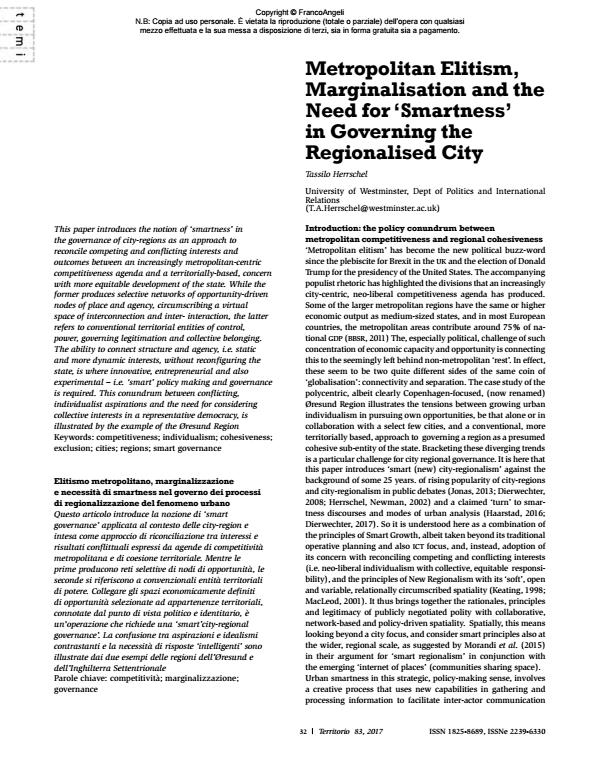Metropolitan Elitism, Marginalisation and the Need for ‘Smartness’ in Governing the Regionalised City
Titolo Rivista TERRITORIO
Autori/Curatori Tassilo Herrschel
Anno di pubblicazione 2018 Fascicolo 2017/83
Lingua Inglese Numero pagine 5 P. 32-36 Dimensione file 126 KB
DOI 10.3280/TR2017-083004
Il DOI è il codice a barre della proprietà intellettuale: per saperne di più
clicca qui
Qui sotto puoi vedere in anteprima la prima pagina di questo articolo.
Se questo articolo ti interessa, lo puoi acquistare (e scaricare in formato pdf) seguendo le facili indicazioni per acquistare il download credit. Acquista Download Credits per scaricare questo Articolo in formato PDF

FrancoAngeli è membro della Publishers International Linking Association, Inc (PILA), associazione indipendente e non profit per facilitare (attraverso i servizi tecnologici implementati da CrossRef.org) l’accesso degli studiosi ai contenuti digitali nelle pubblicazioni professionali e scientifiche.
This paper introduces the notion of ‘smartness’ in the governance of city-regions as an approach to reconcile competing and conflicting interests and outcomes between an increasingly metropolitan-centric competitiveness agenda and a territorially-based, concern with more equitable development of the state. While the former produces selective networks of opportunity-driven nodes of place and agency, circumscribing a virtual space of interconnection and inter- interaction, the latter refers to conventional territorial entities of control, power, governing legitimation and collective belonging. The ability to connect structure and agency, i.e. static and more dynamic interests, without reconfiguring the state, is where innovative, entrepreneurial and also experimental - i.e. ‘smart’ policy making and governance is required. This conundrum between conflicting, individualist aspirations and the need for considering collective interests in a representative democracy, is illustrated by the example of the Øresund Region
Questo articolo introduce la nozione di ‘smart governance’ applicata al contesto delle city-region e intesa come approccio di riconciliazione tra interessi e risultati conflittuali espressi da agende di competitività metropolitana e di coesione territoriale. Mentre le prime producono reti selettive di nodi di opportunità, le seconde si riferiscono a convenzionali entità territoriali di potere. Collegare gli spazi economicamente definiti di opportunità selezionate ad appartenenze territoriali, connotate dal punto di vista politico e identitario, è un'operazione che richiede una ‘smart’city-regional governance’. La confusione tra aspirazioni e idealismi contrastanti e la necessità di risposte ‘intelligenti’ sono illustrate dai due esempi delle regioni dell’Øresund e dell’Inghilterra Settentrionale
Parole chiave:Competitività; marginalizzazione; governance
Tassilo Herrschel, Metropolitan Elitism, Marginalisation and the Need for ‘Smartness’ in Governing the Regionalised City in "TERRITORIO" 83/2017, pp 32-36, DOI: 10.3280/TR2017-083004